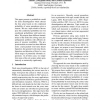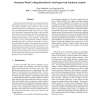2066 search results - page 19 / 414 » Word Maturity: Computational Modeling of Word Knowledge |
113
click to vote
ACL
2010
14 years 9 months ago
2010
This paper presents a probabilistic model for sense disambiguation which chooses the best sense based on the conditional probability of sense paraphrases given a context. We use a...
COLING
2010
14 years 6 months ago
2010
We present a theoretical and empirical comparative analysis of the two dominant categories of approaches in Chinese word segmentation: word-based models and character-based models...
117
click to vote
COLING
2000
15 years 16 days ago
2000
In this paper, word sense dismnbiguation (WSD) accuracy achievable by a probabilistic classifier, using very milfimal training sets, is investigated. \Ve made the assuml)tiou that...
130
click to vote
AAAI
2011
13 years 11 months ago
2011
Effective access to knowledge within large declarative memory stores is one challenge in the development and understanding of long-living, generally intelligent agents. We focus o...
ICDM
2008
IEEE
15 years 5 months ago
2008
IEEE
The goal of sentiment prediction is to automatically identify whether a given piece of text expresses positive or negative opinion towards a topic of interest. One can pose sentim...


